Climate change, an existential threat towering over our planet, manifests through rising temperatures, erratic weather patterns, and devastating natural disasters. The urgency to combat this crisis has never been more pronounced. Although the enormity of the challenge can be daunting, every individual can contribute to the mitigation of climate change. Here’s an extensive exploration of actionable steps we can collectively embrace.
Strategies for Individual Action
The first and foremost avenue for combating climate change starts at the individual level. While systemic change is essential, personal choices wield significant influence over our environmental legacy. Here are ways each person can be a catalyst for change:
Embrace Sustainable Transportation
Transitioning to sustainable modes of transportation is vital. Opting for bicycles or public transit significantly reduces our carbon footprints. Carpooling also remains a pragmatic solution to decreasing greenhouse gas emissions. As electric vehicle technology becomes increasingly accessible, consider investing in a zero-emission vehicle to further minimize reliance on fossil fuels.
Adopt a Plant-Based Diet
The food industry contributes disproportionately to greenhouse gas emissions, particularly through livestock production. By incorporating more plant-based foods into your diet, you can alleviate this burden. Not only does a plant-centric diet enhance personal health, but it also conserves water and promotes biodiversity. Simple, local, and organic food practices can substantially diminish one’s ecological footprint.
Consume Mindfully
Mindful consumption entails making deliberate choices about what and how much we buy. Opt for products with minimal packaging, and consider the lifecycle of the products you use. Choosing sustainable brands and supporting local businesses fosters a circular economy, nurturing environmental sustainability. Additionally, you should prioritize thrift and second-hand shopping to reduce waste.
Community Engagement and Advocacy
While individual actions are critical, collective efforts amplify their effects. Community organizing and advocacy can catalyze significant societal changes. Engage in these constructive discussions and actions:
Join Local Environmental Groups
Participating in local environmental organizations helps build a robust foundation for community-specific climate initiatives. Volunteer for clean-up drives, tree plantings, or educational outreach programs. These initiatives promote awareness and foster collaborative endeavors aimed at maintaining ecological balance.
Campaign for Policy Change
Being vocal about climate policy is paramount. Advocate for legislative measures that prioritize environmental protection. Attend town halls, engage with elected officials, and support measures that promote renewable energy and sustainability. Lobbying for climate-conscious legislation ensures that decision-makers prioritize the long-term health of our planet.
Participate in Climate Strikes and Day of Action
Joining climate strikes can exponentially amplify the voices demanding immediate action from those in power. These collective demonstrations of solidarity are essential to showcase the public’s urgency for comprehensive climate action. Many organizations worldwide coordinate these events, making it easier to join movements that resonate with your values.
Investing in Renewable Energy Solutions
As we pivot towards a carbon-neutral future, investment in renewable energy is non-negotiable:
Install Solar Panels
Investing in solar panels represents a tangible commitment to renewable energy. By harnessing the sun’s power, you can decrease reliance on fossil fuels while often lowering utility bills. Many governments offer incentives to offset installation costs, making it a financially sound choice for homeowners.
Support Clean Energy Initiatives
Support the transition towards wind, solar, and other renewable energy sources either by purchasing green energy from your utility provider or by investing in community initiatives focused on sustainable energy. Understanding the implications of chemical equity and advocating for equitable access to clean energy sources enriches community ties.
Consider Energy Efficiency in Your Home
Improving energy efficiency in your home not only reduces carbon emissions but also conserves resources. Simple actions such as using energy-efficient appliances, insulating your home, and employing programmable thermostats can significantly decrease energy waste. Awareness of energy consumption habits can lead to sustainable lifestyle choices that pave the way for future alterations.
Education and Awareness
Knowledge is a powerful tool in combating climate change. Educating oneself and others fosters a more informed populace that can make conscious decisions:
Stay Informed
Keeping abreast of the latest climate research and policy developments ensures that you remain an informed advocate. Engage with reputable scientific literature and follow updates from environmental organizations to remain educated about climate change and solutions.
Share Knowledge with Others
Share your knowledge with friends, family, and social circles. Organizing informational workshops or community discussions helps demystify climate change and raises awareness about practical measures that can be taken. The more informed individuals are, the more likely they are to make conscious decisions.
Utilize Social Media for Awareness
Leverage social media platforms as powerful tools for disseminating information about climate change. By sharing articles, infographics, and videos, you can spark conversations and inspire collective action. Engaging with others online promotes a sense of community focused on tackling this pressing issue.
In conclusion, combating climate change necessitates multifaceted approaches that encompass individual actions, community engagement, and policy advocacy. Every small change compounds into substantial results. By equipping ourselves with knowledge, staying engaged, and committing to sustainable practices, we can forge a more resilient future for our planet and all its inhabitants. Our choices today shape the world of tomorrow.







